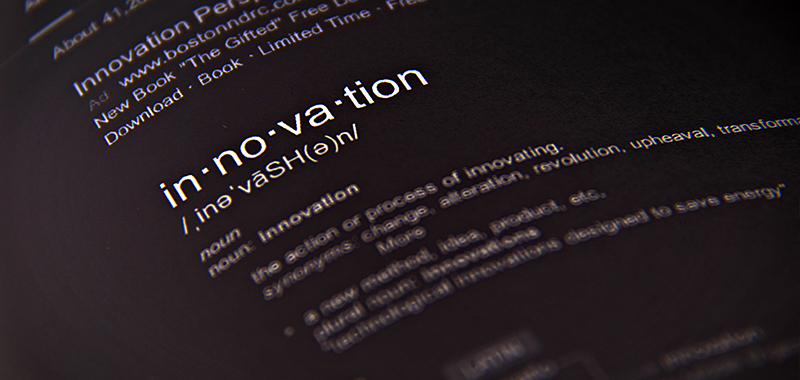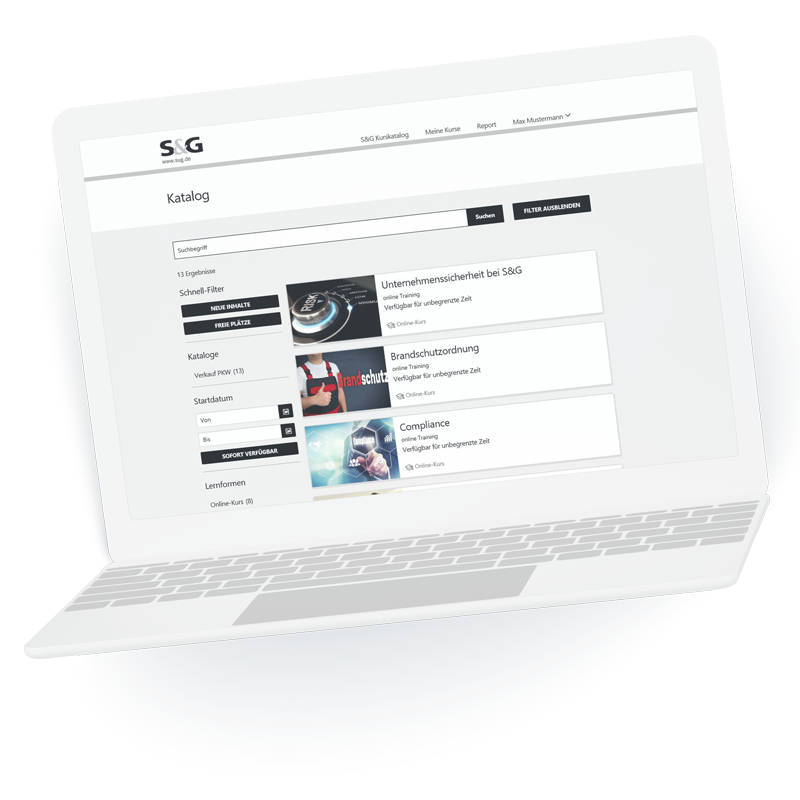
Who is meant to pay for all that?!
Overcoming typical arguments against LMS and convincing your stakeholders
The introduction of a learning management system (LMS) is a landmark decision with lasting effect on company processes. Its success hinges on those responsible for the launch taking due account of their stakeholders - and not underestimating them. Each department has unique interests, requirements and perspectives.
Failure to involve data protection officers, works councils or the HR department in the initial stages can, for example, result in avoidable delays and unnecessary conflict. This makes it crucial to integrate stakeholders into the project early on. We have compiled some expert tips and a checklist to help you on your way.
The real work only starts with the decision to implement a learning management system. After a long fight for a decision, those involved are often highly motivated and want to get started on the provider selection and realisation as soon as possible.
Unfortunately, this frequently means that they forget to involve key stakeholders within their organisation in due time. If responsibilities, requirements and potential risks are not discussed at an early stage, and other departments and employees are left out of the loop, problems are almost a given.

Florian Casper, imc Data Protection Officer, cautions against ignoring stakeholders: "It is extremely important to know your interest groups and involve them early on. Works councils, data protection officers and IT departments all bear a lot of responsibility in relation to the processing of personal data. That makes it even more upsetting for these functions if they are presented with a done deal.
We have experienced on numerous occasions that LMS implementation projects come to a halt, because these stakeholders were not informed about the planned procurement. Early and transparent involvement of these functions helps to avoid unnecessary internal conflicts, ensures smooth and straightforward project execution and also prevents high additional costs that would be incurred through project delays or abortions."
Elisabeth Schulze Jaegle equally emphasises the importance of getting stakeholders on board from the outset. The independent expert for digital learning and agile learning designs often acts as a mediator between different interest groups and recommends early talks.
Especially in relation to the works council, she advises: "Successful LMS implementation for the long term can only be achieved in close and fair cooperation with co-determination parties, i.e. the works council. Especially in relation to the processing of personal data, the works council has a great say. It should be actively involved from the beginning, and can also be a strong partner for personnel development."

Clarifying the following questions in advance will help you prevent unnecessary conflict and delays:
- Who are my stakeholders?
- What potential concerns might arise in the implementation of the LMS?
- What are the counter-arguments?
- Who should be informed when?
Typical argument
LMS involves costs, but does not generate profit. A good LMS helps users work notably more efficient and promote talents. This drives progression for the organisation. Costs are lowered in the long term.
Response
The outcome for the organisation is also determined through learning analytics. That means learning happens not just for the sake of learning, but in line with KPIs.
Timing and manner of information
The management team or investor makes the decision. It must approve the project and costs. You should therefore provide information on planned steps and realised milestones.
Tip: Create a business plan early on, and list effects for the organisation – ideally with clear KPIs (financial and efficiency indicators) rather than relying on soft factors.
Typical argument
1. Resources for the management of such a system are not available.
2. Employees (especially older ones) will not accept the system.
Response
1. Training already takes place today => There are no additional costs. On the contrary: An LMS facilitates decentralised organisation, as opposed to central administration involving individuals.
2. A good LMS can be adapted to the requirements of different user groups. Simple and intuitive operation also motivates older employees.
Timing and manner of information
The HR department is a central contact and should already be consulted when choosing the provider to clarify which data and interfaces are required.
Especially for internal HR and personnel development processes, the HR department should be involved at an early stage.
The system owner question should be given due consideration => It is often assumed that the HR department is the system owner per se. However, a dedicated L&D department is established in most professionalised organisations, which assumes responsibility for HR development.
Typical argument
1. Employees are constantly monitored and controlled.
2. Employees are not given enough time for digital learning.
Response
1. A professional LMS compliant with European data protection regulations facilitates customised configuration as required in works agreements. This allows the works council to define the data to be generated together with the internal project participants and the provider. The works council can also be involved in any communication including the releases.
2. A well-designed LMS concept saves employees unnecessary training courses, and develops them in line with their personal goals.
Timing and manner of information
The works council should be informed during the selection process for the provider in order to define the catalogue of requirements together with other stakeholders.
A workshop (ideally not linked to a specific provider) with an expert who can explain terminology and present the opportunities of e-learning in general and/or specifically in an LMS is recommended.
Remember: The works council has a legal right to stop the entire project!
Typical argument
Available human resources do not stretch to implementation, maintenance and support requests.
Response
A good LMS has standardised interfaces that facilitate easy integration into the existing IT infrastructure. A professional service provider offers ongoing support. Intuitive operation prevents excessive support requests.
Cloud-based systems also simplify project design and minimise the use of IT resources.
Timing and manner of information
The IT department should be consulted during the provider presentation and before the interfaces are defined. Also check, whether fundamental IT guidelines (security, cloud, etc.) exist which must be furnished to the provider in the selection process.
Subsequent support must also be clarified with IT (e.g. Who handles 1st level support?)
Typical argument
Sensitive employee data is collected. An LMS is not secure enough.
Response
A well-designed authorisation concept prevents data getting into the wrong hands. A serious cloud provider will guarantee compliance with data protection provisions. If an on-premise solution were selected, data would always remain within the organisation.
Timing and manner of information
The data protection officer has an advisory and supporting role. They should be consulted before the contract is awarded to review the processing of personal data from a holistic perspective, and be given the opportunity to voice any concerns.
They can also help to select a suitable operating model, and prepare the documents needed for data protection issues or requirements together with IT Security and the provider.
Typical argument
I get lost in the system if left to my own devices. I don’t have time for e-learning.
Response
User-friendly design ensures intuitive operation. Micro-learning nuggets available on mobile devices facilitate learning on the job – during regular working hours.
Timing and manner of information
This group is often left out, even though employees are the very people for whom the LMS is introduced. That is why you should inform your employees about the planned implementation and keep them in the loop.
Many concerns and uncertainties can be avoided through targeted communication and training in advance.
Above all, Elisabeth Schulze Jaegle recommends looking at each stakeholder - especially the works council - as a partner and promoter of learning culture and learning offers, rather than a stumbling block and time waster.
We all know: If key interest groups within an organisation are in favour of a project, this has a crucial impact on acceptance levels in general. Thus, open and early communication is the foundation for successful LMS implementation.

Courage to the LMS - even as SME!
Not only big companies should have the courage to go for a Learning Management System. In our interview Christian Mai from S&G Mercedes Benz, tells about his experiences with rolling out an LMS in a Small and Medium Enterprise (SME).

The big e-learning glossary
WBT, SCORM, Predictive Analytics, Blended Learning - uh, what? The first two articles in this series are a glossary for those who have felt lost in the e-learning jungle of abbreviations and technical terms.

More information about the LMS
If you would like to find our more about the Learning Management System of imc, please find all information here.
Contact
I have been working in the Marketing & Communication Team at imc since March 2019.
Communication, creative content and social media are my passion. "KISS - Keep it short and simple" is my credo.
To explain complex content in an understandable way and thus make the topic of e-Learning accessible to everyone is an exciting challenge every day.
Privately I love to read, play poker and travel a lot.
I am always happy to receive feedback or suggestions.

Stop boring software-trainings!
Let's not kid ourselves. Nobody wants dreary and uninspiring training and only very few are fully motivated when they hear that a Learning Management System (LMS) is involved.
If then unclear task and team structures are added, the enthusiasm is ultimately gone.
This is exactly where Sarah Hillmann wants to help. She has been working for imc in Melbourne for over four years as a Business Consultant and Training Specialist. One of her main tasks is to introduce customers to the IMC Learning Suite, the company's own LMS, in an informative and entertaining way.
In this interview, she talks about challenges opportunities, and the mistakes customers should avoid before purchasing a Learning Management System (LMS).

Interview partner
Sarah Hillmann
Consultant & Trainings Specialist at imc in Melbourne, Australia
Hello, Sarah, glad you're here. You've completely revamped the concept of imc Learning Suite training. How is it going so far? What did you change?
The old training consisted in a three-day training course with everyone who will later work with the LMS as administrator in different roles. It must be said that the administrators are, for example, HR employees or working in other specialist departments, i.e. people without an IT background.
Some of them see such a system for the first time during the training, which can be a bit intimidating. They have the fear or even expectation that they would have to learn everything about the LMS within three days; which is of course completely unrealistic. The training sessions themselves then consisted mainly of lots of slides, which was a bit of a blow for many customers.
My goal was to pick up the customer where he is and familiarise him with the system step by step. For this purpose, I developed the "Learning Suite Champion Path", which is held directly in the LMS and consists of several steps.
How exactly is the newly designed training now structured?
At the beginning, the customer receives a welcome e-mail with all information about the next training courses and a link to our customer portal. Next, there will be a kick-off webinar for training planning with all administrators. Here we will ask what the priority are, what the expectations are and what the admins' areas of responsibility are.
It is very important that really every single future Learning Suite Champion is present, who will later work with the system, so we can truly optimize the training.
Often customers cannot really estimate in advance which functions they need. In addition, prior to the training there was often only contact with the project manager, who sometimes has different ideas than the training participants.
Afterwards, the participants have time to explore the customer portal, the "Learning Connect Academy". There is an online course which prepares them as well as possible for the Basic Training. The course includes a video series, exercises, quizzes, training slides and other useful documents.
This is where a change of perspective takes place, so to speak, and the person who later creates or enters training courses slips into the role of the learner. This enables administrators to better structure learning paths and create tailor-made content. The participation in this course is the basis for all further trainings and the course can also be watched again, in case personnel changes and new admins must be trained.
A little later the Basic Training will follow. This stretches over two days of face-to-face courses in which we look at and explain the system together with the customer. This is not without theory, because the customer must understand and master the most important functions and features of the Learning Suite. However, there are always practical exercises.
After the Basic Training we offer a final webinar. In terms of time, this should not be held immediately after the Basic Training, so that the information can settle down and the participants have enough time to explore the LMS themselves and to practice.
This last webinar is virtually a scenario-based workshop in which we work with the customers to find out which individual learning scenario is best suited for them and which functions they can use to create it.
In summary, the main learning objective of the Basic Training is to be able to create and manage learning content. The future champions should then be able to know the functions and the system to such an extent that they feel confident to explore it on their own.
What happens when the admins have mastered all the basics?
In addition to the Basic Training, which in the future every customer will receive automatically, there is the Advanced Training, which can be held either as face-to-face training or web session. In the Advanced Training, we look at a specific customer scenario, take another close look at the functions that can be used for this purpose and work out a solution together with the team.
Let's say, the customer would like to be trained in blended learning strategy. Then we consider together with the customer how we can best approach the topic and which functions are best suited for its implementation. I give tips and try to provide inspiration and best practice examples. In many cases, the customer doesn't know exactly what he/she needs or better: what is available.
My colleagues and I, therefore, act more as sparring partners than trainers for the customer in these sessions. Often there are many paths that lead to the goal and we must find out which path is best suited for the particular customer.
Are these new trainings only available for new customers, or also for existing ones?
Partly. The Advanced Trainings can also be booked by existing customers. We are currently in the process of rolling out the training worldwide and the consultants in all countries are now beginning to orient themselves to the new strategy.
Each consultant can adapt the training flexibly, because not every customer is the same and some projects are significantly more complex than others. We are therefore eagerly awaiting feedback from colleagues and, of course, customers.
What does it all cost? Are there fixed prices per course, or can packages be booked?
For new customers the Basic Trainings are included in the price. Existing customers can request training packages or individual courses in the Learning Connect Portal and then receive an offer. This depends on the complexity of the topic, because individual topics can be approached very differently.
There is also a consulting package that is very flexible. For example, we held 1.5-hour web sessions a week for three months with a major customer here in Australia, and in these sessions, we addressed exactly those topics where the customer needed support and presented the corresponding functions and features.
What are the biggest challenges for you as a trainer and for the customer?
e challenge for us is to make a boring software training course as exciting and intuitive as possible. The customer should have fun and we must convey our knowledge in such a way that the logic of the system becomes clear and the customer also knows how versatile and flexible the system is.
But such a high degree of flexibility also requires a very high degree of complexity. This is an opportunity on the one hand, but also a challenge for every admin on the other. Therefore, it is also part of our task to take away the fear of the system from the customer.
To what extent does the Learning Connect Portal continue to support the customer after the training sessions?
The portal is our knowledge platform, so to speak. Apart from course bookings and courses themselves, customers can also watch various videos, read release notes and find out everything about upcoming webinars. The portal is a kind of Wikipedia for the LMS and has a catalogue function that can be used to search for functions.
In addition, customers can exchange information among themselves in the admin forum. It happens often that a customer can help another customer because he/she has had a similar problem before. This is extremely helpful and valuable.
Can you tell us your top 3 tips for all those who want to buy an LMS?
- Define requirements: The first and most important thing for me: You must know which requirements your LMS has to fulfil. How complex are my scenarios? It depends on this question how complex the LMS must be.
The more flexibly the system can map processes, the more complex it is, of course. Here you have to think carefully about what you need. When in doubt, you should also get advice on this, otherwise you will end up with a system that is either too complex or cannot meet your requirements. - Clarify care and support: The second would be to pay attention to how well you are looked after. How do the training courses run, what does the support look like, and generally how am I guided through the implementation?
- Define team building and responsibilities: This may not seem obvious at first glance, but I think it's very important. Often admin teams are thrown together wildly, and it is not clear who is responsible for what.
For example, who is the system owner and contact person for other administrators? If the team is not clearly defined, misunderstandings occur again and again, which in the end also cost unnecessary time and money.
What would be your wish for the future regarding imc training?
I would like to implement our blended learning strategy even better in order to train customers in the best possible way. I would like us to continue standardizing training on a global level and to be known not only for our products and projects but also for our training.
Sarah Hillmann is developing new training methods to help imc's customers get to know the Learning Management System in a more interactive and playful manner.

Courage to the LMS - also as SME!
Not only big companies should have the courage to go for a Learning Management System (LMS). In our interview Christian Mai from S&G Mercedes Benz, tells about his experiences with rolling out an LMS in a Small and Medium Enterprise (SME).

The big e-learning glossary
WBT, SCORM, Predictive Analytics, Blended Learning - uh, what? The first two articles in this series are a glossary for those who have felt lost in the e-learning jungle of abbreviations and technical terms.

More information about the LMS
If you would like to find our more about the Learning Management System of imc, please find all information here.
Contact
I have been working in the Marketing & Communication Team at imc since March 2019.
Communication, creative content and social media are my passion. "KISS - Keep it short and simple" is my credo.
To explain complex content in an understandable way and thus make the topic of e-Learning accessible to everyone is an exciting challenge every day.
Privately I love to read, play poker and travel a lot.
I am always happy to receive feedback or suggestions.

Courage to the LMS!
-A practical example-
Let's be honest, when you hear Learning Management Systems (LMS), you will think: "Much too expensive", "not affordable for us anyway", or: "We don't have enough personnel for it". Sound familiar? Don't worry, you're in good company. Many customers, above all small and medium-size enterprises (SMEs) share exactly the very same doubts.
The example of SundG Automobil AG shows why the purchase is still worthwhile. The world's oldest Mercedes Benz dealer has been using imc's LMS for its 1,300 employees since 2016.
In an interview, Christian Mai from S&G, reports on his experiences with the implementation, gives practical tips and explains why an LMS can even increase the appreciation of employees within the company.

Interview partner
Christian Mai
Mainly responsible for Learning Management System at S&G
Hello Mr. Mai, thank you for your time. First question: What does good e-learning mean to you?
An opportunity to give employees knowledge they enjoy and what they not only see as a duty, but what makes them feel entertained and what they like to do. Good e-learning should also offer a change from the normal working day.
When it comes to the introduction of LMS, many companies, especially medium-sized ones, are still sceptical. Why did S&G decide to do this?
On the one hand, we wanted to show that we are moving with the times and are open to new technologies. On the other hand, there were of course also very practical reasons. We have around 1,300 employees at 19 locations and wanted to provide fast, direct information across locations without email traffic.
Sometimes it was also the case that employees travelled from location to location to hold training courses, which was neither up-to-date nor efficient. In addition, some employees were informed directly by their superiors about individual training courses, which led to a certain "dispersion loss". It was also never exactly known whether messages were received and read.
Basically, we simply wanted to bundle the whole topic of training and at the same time meet our obligations to provide evidence in respect of training on topics such as money laundering, compliance and data protection. But we also had other concrete problems that we wanted to solve.

...Which ones were there?
Very practical things, for example we have employees who work in the workshop (garage) and don't have their own PC. But they also have to access the LMS, which we call "Learning World", and above all cope with it.
In addition, before "Learning World" was introduced, employees were unable to register for classroom courses on their own. This was a rather complicated process, but it could be replaced by the LMS.
What were the special challenges during the introduction of the LMS?
What we really underestimated, on the one hand, was how time-consuming the administration of "Learning World" would be. On the other hand, it was difficult to find out which employees would actually be able to design visually appealing training courses.
With the Content Studio, which is included in the LMS, it is relatively easy to create training courses yourself, but they still must be created by someone with the appropriate expertise. Previously it was simply that PDFs were created for training courses and sent to the participants, but with the introduction of "Learning World" and its possibilities, the requirements have naturally grown, also of a graphical nature.
What kind of courses do you produce with the Content Studio?
At the moment we mainly use classical presentations with speech synthesis. We once tried to record our own voices to make the whole thing more personal, but that was too time-consuming.
Then we started to use Content Studios artificial voice tool again, and now we're getting away from them. We found out that it simply isn't suitable for many of our employees to have a training with sound, because they can't play it anyway. If, for example, a salesman is sitting in the salesroom, the loud playback disturbs the colleagues. But sitting with headphones does not make a good impression on customers. It's also difficult for fitters who travel a lot.
Since automotive mechatronics technicians, service consultants and sales staff are our three largest professional groups, we tend to get away from speech synthesis in these groups.
How does the creation of training content work?
Originally, we had appointed a total of 20 authors from various fields. However, we have now reduced this number to five to six people, because we have noticed that it makes more sense to have fewer people who have more practice in creating the training. We now have the authors and those responsible for the content.
The authors coordinate the trainings with the responsible persons, check them and determine for which employee group the training should be obligatory. Then all the training sessions come to me, I check the framework conditions, such as compliance with the corporate identity, test on various end devices and then transfer the whole thing into Learning World.
How did you train the authors?
The authors first received a two-day workshop from imc. That was a very good basic framework, but afterwards it was still a lot of learning by doing. We strongly supported each other and gathered a lot of feedback from the staff. That was very important for us, because we first had to learn what each individual employee group needed individually.
If, for example, it was self-explanatory for me to have to click on an arrow at the bottom right to go any further, it might not have been clear to an older employee from the assembly department. So, we had to get to know our target group and their needs and adapt the training specifically.
Which function of the LMS do you use most?
For us, automated assignment is something that saves a lot of time and administration. When each user is created, they aresorted into a specific group according to their activity. Depending on which user group, i.e. which department they are in, they are automatically registered for certain courses. The system is linked to our SAP and if, for example, a new trainee joins, he is automatically assigned to the "Trainee" group and the corresponding courses are automatically booked for him.
Some courses are also mandatory for all employees, such as fire protection, data security or first aid training. There are also specialist training courses, some of which build on each other. Only if the new trainee has passed course A, in order to stick to the example, can he start course B, and so on.
The supervisor can also see when he has completed the courses and can determine when each course must be completed. The trainee can, however, decide flexibly when he wants to take the course and whether he prefers to take it in one go or on several days.
How is the acceptance of Learning World with your employees?
Very high almost throughout. We first had an official information event where Learning World was presented. In addition, our Executive Board, which was really behind the project from the very beginning, was personally very committed to it and, for example, talked about it again and again at works meetings. He also said to me once in fun: "If there are complaints, just refer the people directly to me".
With such a project a strong backing helps immensely and, in my opinion, this is also an advantage of SMEs. We can react more flexibly and are closer to our employees than is the case with large corporations.
But what was also extremely important for the acceptance of Learning World was to make it clear that we don't want to impose any additional work on the employees, on the contrary we want to save them work and paperwork. Although there are still a few sceptics who don't like these "new-fangled things", on the whole we received very positive feedback. Especially when the employees find out that it is the company's own colleagues who create the trainings, they find it great and are proud of our "S&G products".
Could the system in general meet your expectations?
Mostly yes. What we wanted above all was a reduction in paperwork and bureaucracy. The paperwork has really improved a lot, but we still have to struggle with the bureaucracy and the right settings.
But what is definitely already there is a significant time saving, since we were able to convert many classroom training sessions into online courses. In addition, the automated assignment of training courses and instructions saves us a lot of mail and time.
Would you say afterwards that you underestimated the introduction of the system?
As a company, probably yes, as is often the case with large projects. Things are always added or interfered with that you haven't taken into account. In the beginning we didn't really know what possibilities there were and what we could do with the LMS.
As a person, however, I think I assessed it reasonably realistically, but only joined the project when the decision had already been made. I am an automotive salesman and worked in the human resources department of S&G. I also studied business administration and business psychology. My boss, however, wanted there to be a person with the main responsibility who already knew the company, so he brought me into the project team in 2017.
Therefore, because I am not a computer scientist, I had great respect for the topic and the scope. In the meantime, I've worked my way into it quite well and most of it runs relatively smoothly. Of course, there are always minor problems that you can't see coming before.
What would you like to use the system for in the future?
There are some topics that we still want to integrate. One example would be induction concepts for employees according to activity groups, which are currently still controlled manually by their superiors. In some cases, signatures have to be obtained from the instructing employees. That would be an idea to represent this process digitally.
But quality management topics that are currently still on the intranet could also be linked to further reduce administrative effort.
If you had a wish for a good LMS fairy godmother, what would that be?
I am now used to it, but when I started working with the LMS, I, as someone with no IT background, found it was not really intuitive at first. There are so many masks and possibilities that I felt a bit exhausted. For each small topic you have to open new buttons and enter new terms.
In the meantime I have developed my routine and found my way around, but in the beginning I would have liked the system to have been more self-explanatory.
Finally, do you have any concrete tips on what a company should bear in mind when introducing an LMS?
Difficult question, there is a lot! It starts with the question of whether you control the whole system centrally, as we do, with regard to organisation and administration. Then you have to think carefully about how the authors should work and who should become an author at all.
Here you have to weigh very carefully and the basic question you have to ask yourself is: Do I want employees to create courses that are already familiar with the processes and structures of the company, but first have to be didactically integrated, or do I hire someone who has the technical, didactic background, internal structures for it does not know.
Also very important and to be clarified at the beginning is the question of the main responsible person and contact person. This is not only essential for system implementation, but also plays an important role for employees and acceptance. Employees need to know who to turn to when they have questions. In my opinion, it makes little sense to appoint different contact persons, for example, one who is responsible for the design, the other for the content of the training courses, and so on. It is better to have a person in charge who is centrally in charge.
But you have to be aware that the introduction of an LMS, like all major projects, is always associated with certain difficulties and never goes smoothly.
Thank you very much for the exciting discussion, the good tips and continued success with the optimisation!

SundG Automobil AG is the oldest Mercedes Benz dealer worldwide. Since 2016, the company has been using imc Learning Suite for its 1300 employees.



Stop boring software trainings!
Stop boring software-trainings! That is the mission of Sarah Hillmann, Trainings Specialist and Business Consultant.
She has prepared a new way to train customers for using imc's Learning Management System.

Convincing stakeholders for an LMS
The success of introducing a learning management system hinges on those responsible for the launch - and not underestimating them. We have compiled some expert tips and a checklist to help you in convincing your stakeholders.

More information about the LMS
If you would like to find our more about the Learning Management System of imc, please find all information here.
Contact
I have been working in the Marketing & Communication Team at imc since March 2019.
Communication, creative content and social media are my passion. "KISS - Keep it short and simple" is my credo.
To explain complex content in an understandable way and thus make the topic of e-Learning accessible to everyone is an exciting challenge every day.
Privately I love to read, play poker and travel a lot.
I am always happy to receive feedback or suggestions.